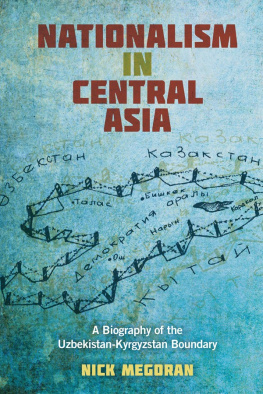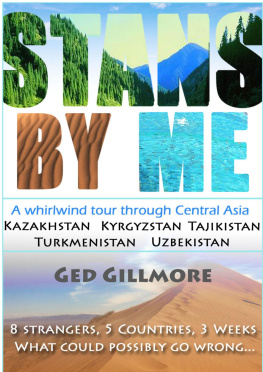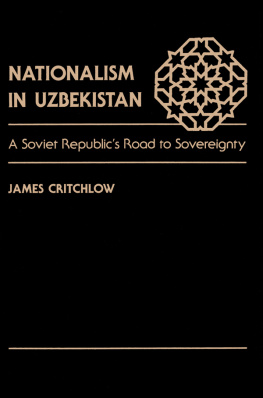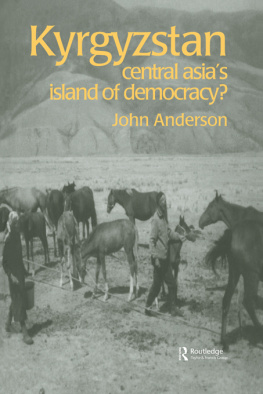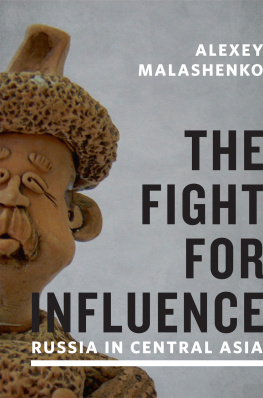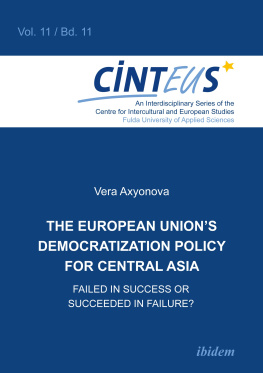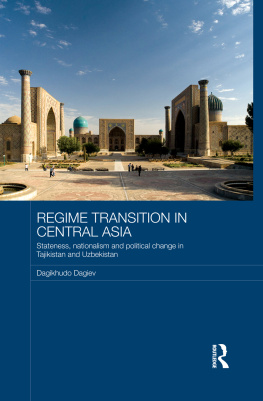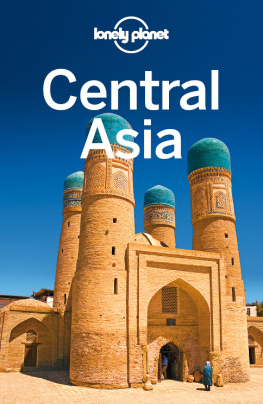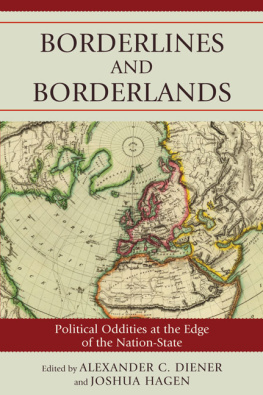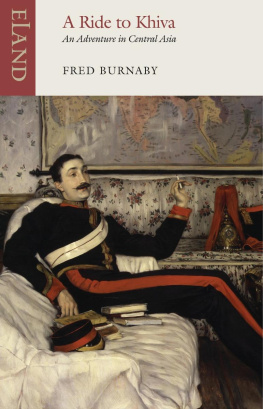This book is dedicated to my parents, Peter and Helen Megoran, who encouraged me to love learning; and to Chek, Osh, and other extraordinary places along the Kyrgyzstan-Uzbekistan Ferghana Valley boundary that no longer exist.
ACKNOWLEDGMENTS
This book has taken eight years to write and is the culmination of twenty years research and contemplation, so unsurprisingly there are many people whom I wish to thank along the way. I owe the greatest debt to four borderland families: those of Boumairam Ismailova and the late Hotamjon Hojibuvaev in Osh, and Asylbek Joroev and Solimirza Jumabaev in Chek. In each of these families I have seen older generations age gracefully and pass into the grave, and new generations be born, grow up, marry, and make their own way in life. Their welcome, hospitality, and love toward me over the years have made the borderlands seem like a second home to me. They taught me how to comport myself appropriately, and their combined influence on the contents of this text is considerable. The lives of all of them were changed profoundly by the events of 2010 described in chapters of this book. A fifth family, that of Shergazi Jumabaev, made me welcome in Naryn while I studied Kyrgyz and looked after me in Bishkek when I needed it. I am similarly grateful to my host family in Tashkent.
I have benefited enormously from the insights and teaching of those who have overseen and mentored my work. In Cambridge my first doctoral supervisor, Graham Smith, encouraged me to come to Sidney Sussex College and pursue my enthusiasm for Central Asia and my fascination with nationalism. He has been much missed since his death in 1999, and his influence is still felt within political geography. I am profoundly grateful to Alan Ingram for taking over Grahams supervisory role. I also benefited from the careful reading of my work by Annette Bohr, Deniz Kandiyoti, and Sarah Radcliffe. Piers Vitebskys Magic Circle seminar group, with its unique improvisational studio-workshop format, was a ceaseless source of help and inspiration. Abylabek Asankanov granted me generous access to his extensive archives in Bishkek. In Osh State University, Yodgor Jalilov taught me to savor the Uzbek language, and Tashbolot Jururov had the unenviable task of trying to teach me Kyrgyz la Asaba, but taught me more than just words and phrases as we explored his remarkable language together. Hakimjon Hasanov and Faizila Irisov imparted something of the awe they feel at the cultural wealth of Uzbek and Kyrgyz literature and spirituality.
I have enjoyed myself so much in the Uzbekistan-Kyrgyzstan borderlands not simply because they are intrinsically such interesting places but because I have been befriended by so many wonderful people who helped me understand the Ferghana Valley and have fun in it. It would be impossible to mention everyone, but thank you Mahliyo, Mohadil, Rustam, Anara, Ziloloa, Ulugbek, Komil, Clare, Alan and Val, Helen, Willem and Karolien, Shukrat, Hilola, Max, Dima and Lena, Zak, Rahatbek, Ron and Londa, Miktibek, Wim and Riet, Kent and Linda, Hosiljon, Manas, Alisher, Timur, Iskender, Wilbur, Ravshan, Nazira, Hairahon and Husanboy, Richard and Angeline, Otabek, Diloram, Akram, Farhod, Kiyal, Eldiar, Rahat, Ikbol, Mira, Alla, Oleysia, Peter, Ted, Lisa, Sveta, Nazira, Anara, Bahrom, Hotamjon, Haldun, Alisher, Sanjar, Ymurbek, Janna, Mathilde, Kydret, Hakima, Abdulatif, Nodir, Abdumanap, Ilhom, Tursunbai, Chynara and Kuba, Sergei and Damira, and Muktahr, plus others in Ferghana Universitys Fifth Dormitory, and Osh State University Profilactoriya. Away from these two bases, in the villages and enclaves along the boundary I enjoyed time spent with Nurbek, Ikbol, Manap, Suhrob, Hurmamat, Dusha ake, Robert, Nazgul, Suhrob, and Abdumalik. Ozoda, Mara, and Guljan: thank you so much. I am much appreciative of the friendship and support of Joel and Clare Harri, Chris and Asa Duff, Almaz Jurorev, Rustam Mamashev, and Elbek Hojibuvaev. Elsewhere in Kyrgyzstan and Uzbekistan outside the Ferghana Valley time spent with Roza and Gulaim, Jeff, Jangyl, Erdin, Krista Sue, Chris, Beruniy, Jamshed, and Anita was precious.
The wealth of knowledge and clear insights as well as practical guidance of dedicated journalists Mahmud Kazakhbaev, Alisher Toksonbaev, Habibulla Idrisov, Abdumomin Mamaraimov, Gulnara Kasmanbetova, Mahamadjon Hamidov, Shahida Tulaganova, Arslan Koichiev, and Turdayim Kojomberdieva were invaluable, and time spent together was immensely pleasurable. Justin Burkes close editing of shorter articles for EurasiaNet.org enabled me to formulate ideas and arguments as I went along. It was a pleasure to know Alisher Soipov as a student and an honor to help establish him in his first journalistic job at Alliance Press; his horrific assassination in 2007 may have silenced his voice, but his memory and what he stood for are not forgotten.
I am grateful to poets Sherali Juraev in Uzbekistan and Shamirbek Tugunbaev in Kyrgyzstan. Likewise, in Osh Jolboldu Alibaev was a true poet in a sea of charlatans, and the late Ganijon Holmatov was likewise an inspiration to so many of us in so many ways. That both men lived and worked in the same city at the same time is a reminder of how culturally rich a borderland community can be.
In Kyrgyzstan, Chynara Tashmambetova, Rano Madinova, Aijan Sharshenova, and Koison Shakirova helped me collect material and conduct research. Rustam Mamashev and others in Uzbekistan who would rather not be named provided similar assistance. Madina, Nazgul, and Salima of Oshs main post office on Lenin Street helped keep me linked to home and assiduously managed my newspaper subscriptions over the years.
I have been drawn to all things Central Asian since childhood, and a great pleasure of my vocation is to be able to try and understand the region through discussions with fellow students of this remarkable part of the world. These include Sarah Amsler, Gulnara Aitpaeva, Aida Alymbaeva, Laura Adams, David Lewis, Anara Karagaulova, Balihar Sanghera, Burul Usmanalieva, the late Will Myer, Sally Cummings, Dave Gullette, Shirin Akiner, Maria Louw, David Montgomery, Alexander Morrison, Bhavna Dave, Johan Rasanayagm, Elmira Satybaldieva, Rano Turaeva, David Lewis, Jo Smith Finley, the late Irene Hilgers, Aksana Islmailbekova, Muhammadjon Mamasiadov, Kersten Klenke, Duishon Shamatov, Matteo Fumagalli, Tom Hale, Stefan Kirmse, Saikal Ibraimova, Natalie Koch, Alex Diener, Aijan Sharshenova, Alisher Faizullaev, Asel Doolotkeldieva, Caroline Upton, Jake Fleming, James Nixey, Rahima Umarova, Magnus Marsden, Caroline Humphrey, Shavkat Atakhanov, Sairagul Matikeeva, Stuart Horsman, Medina Aitieva, Razia Sultanova, Daniel Stevens, Nienke van der Heide, FM, Natsuko Oka, Hamid Tursunov, AA, Valeriy Khan, Saniya Sagnaeva, Mark and Ruth Dickens, Britta Korth, Chris Seiple, the late Claudia Stein, Cathy Alexander, Siddharth (Montu) Saxena, and Sevara Sharapova. My understanding of Uzbekistan and Kyrgyzstan has been particularly informed by conversations with my dear friends Alisher Khamidov, Morgan Liu, and John Heathershaw.
As well as these Central Asianists, I have been incredibly fortunate to have found myself part of a wider network of geographers and others who have formed and assisted my thinking. At Cambridge these were in particular James Blake, Harriet Bulkeley, Craig Jeffrey, Anthony Gristwood, Liz Watson, Andrew Jones, Dave Rippin, Mitch Rose, Liz Gagen, Simon Cross, Niall Jonson, Emma Wilson, Steve Caudwell, Rie Tsutsumi, Norman Kerle, Nicola Higgins, Dave Lambert, the late Lisa Smirl, Richard Powell, John Casson, Steve Legg, Murat Asel, Ratna Jeetoo, Kiku-e Tachibana, Jon Conlin, Diana Wahbeh, and Reuben Brigerty. It is hard for me to overstate the pleasure and inspiration received by discussing Nietzsche, Heidegger, and anthroposophy with Jonael Schickler, whose death in the Potters Bar rail disaster as he returned to Cambridge to receive his MA was a tragedy. Fellow political geographers in other places including Sara Fregonese, Adam Ramadan, Josh Inwood, Jason Dittmer, Philippa Williams, Fiona McConnell, Colin Flint, Simon Dalby, Gerard Toal, Drew Foxall, Sara Koopman, Klaus Dodds, Joanne Sharp, Jennifer Hyndman, James Sidaway, and Tristan Sturm have helped refine my understandings of space, identities, and power. In Newcastle Jonathan Pugh, Kate Manzo, Rachel Woodward, Kyle Grayson, Simon Philpott, Hartmut Behr, Anselma Gallinat, Nina Laurie, Dan Bos, Matthew Rech, Matthew Benwell, and Alex Jeffrey have provided a closer group of people to do the same with. I have thoroughly enjoyed the company of fellow IBRU-linked border junkies Gerald Blake (who first introduced me to the scholarly literature), Clive Schofield, Alison Williams, Martin Pratt, David Newman, Richard Schofield, and John Donaldson, over the years. The earlier inspiration provided by Douglas Pocock, Janet Townsend, Mike Crang, and the late Mike Drury at Durham University, and my English teacher Miss Kingan of High Ridge Comprehensive School, Scunthorpe, has also molded this book.

